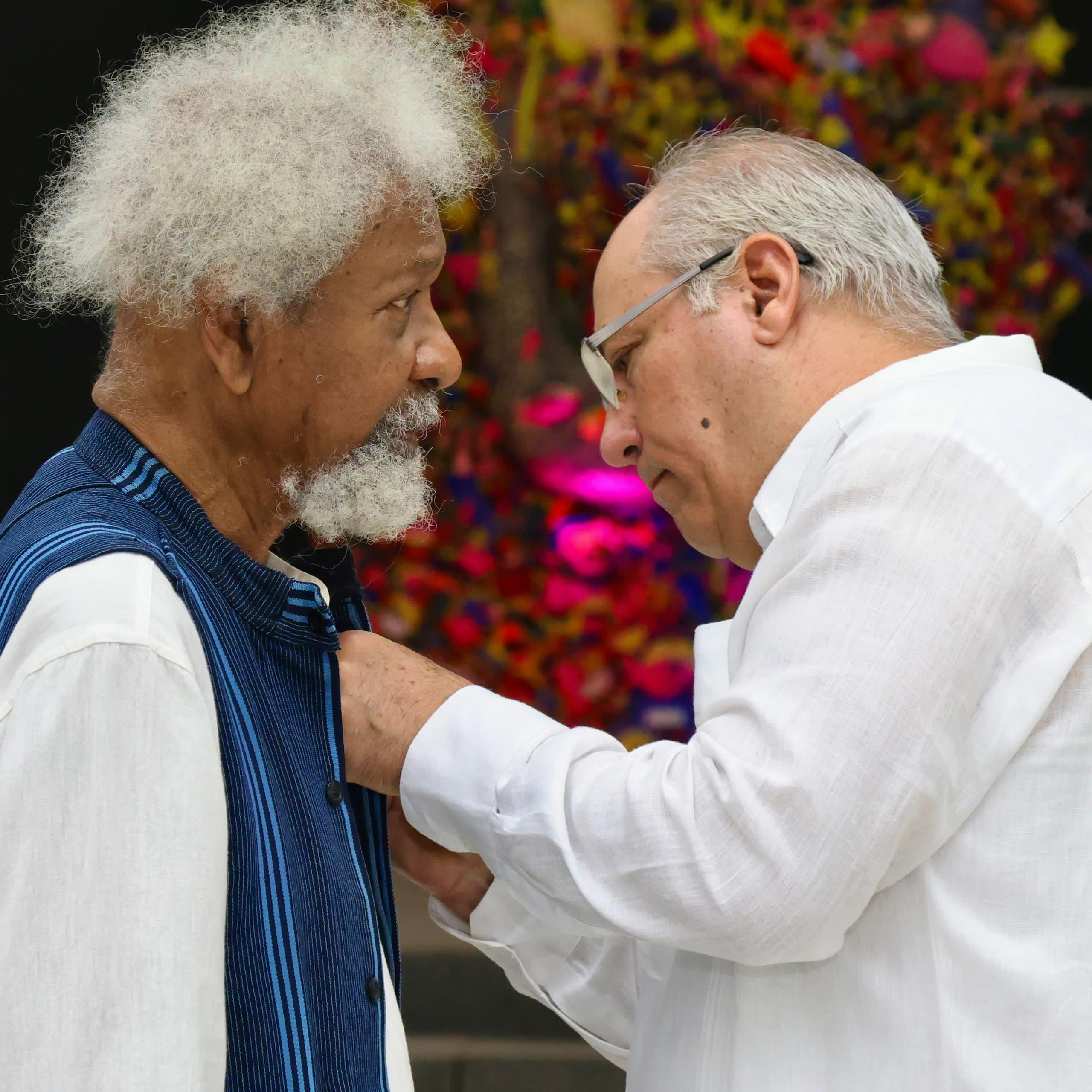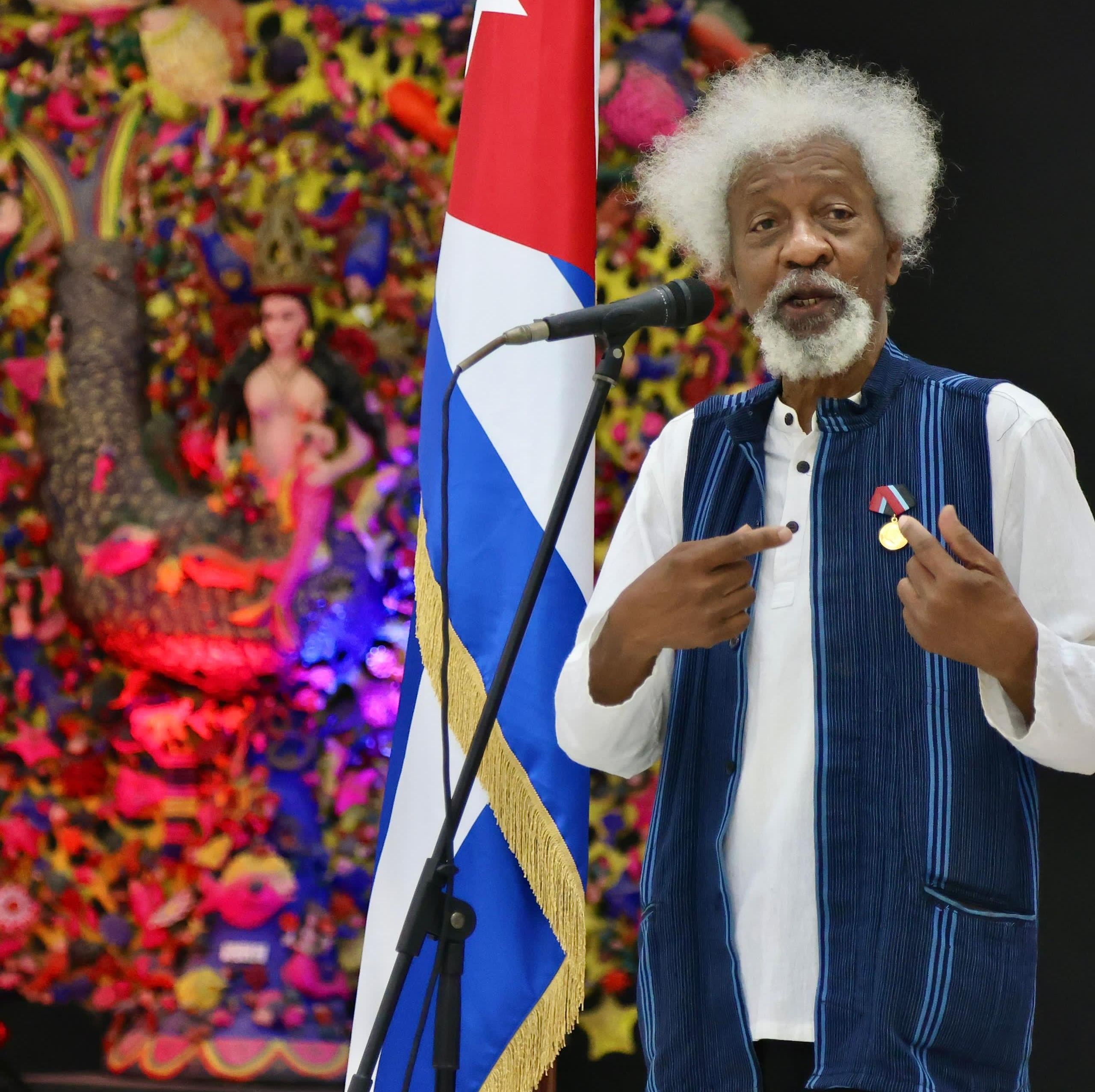
Wole Soyinka stressed the importance of strengthening ties between the mother continent and countries such as Cuba, Brazil and the African diaspora
Photo: Alejandro Azcuy
Havana, August 25 (RHC)-- "Your visit has great significance. It is the visit of a brother who has always been in battle for just causes," said Miguel Díaz-Canel Bermúdez to Nobel Prize winner for Literature Wole Soyinka, with whom he held a meeting after the awarding of the Haydée Santamaría Medal to the distinguished African intellectual on Friday morning at Casa de las Américas.
"The presentation of this medal to you is an expression of many feelings for Cuba." Haydée always emphasized the importance of the contribution of culture to the Revolution, he said. "And we are honored that it was awarded to you," said the First Secretary of the Central Committee of the Communist Party and President of the Republic.
With you we "share ideas, dreams, commitment to human improvement," commented the Cuban leader, who highlighted the significance of the stay of the Nigerian writer on the Island in such complex times for Cubans.
"These are moments," he said, "marked by the intensification of the blockade and a perverse media intoxication as part of the strategy of cultural colonization by the hegemonic powers, and not only of Cuba, but of all the peoples of the world."
Díaz-Canel purposely highlighted the relevance of the celebration of the International Conference on the Routes of Enslaved People, "New Narratives: Memory, Resistance and Vindication" -- on the occasion of the 30th anniversary of this UNESCO program.
The meeting addressed, among other issues, topics such as race and discrimination, and among its main participants was Wole Soyinka
"It has been a conference," emphasized the Cuban leader, "that has contributed much to the battle that Cuba is fighting and that we share with our sister peoples. It is a meeting that must be a reference in the fight against discrimination, xenophobia, wars."
In the exchange with the Cuban president, Wole Soyinka stressed the importance of strengthening ties between the mother continent and countries such as Cuba, Brazil and the African diaspora.
The Nigerian writer also highlighted the role of the Cuba in the liberation of African countries. "Our ties with Cuba are not limited only to art, literature, but also to liberation," Soyinka emphasized.

Photo: Alejandro Azcuy
An act of justice that honors us
Awarding the Haydée Santamaría medal to Wole Soyinka, which has been previously received by many of the most outstanding figures of Latin American, Caribbean and other world intellectuals, "is an act of justice that honors us."
This was expressed by Jorge Fornet, director of the Center for Literary Research and the magazine Casa de las Américas, in his words of praise for the award given to the Nigerian intellectual, which was awarded by the Minister of Culture, Alpidio Alonso Grau.
With this act, it was explained at the ceremony, Casa de las Américas also joins the tributes that one of the greatest intellectuals of this time has received for his 90th birthday.
It was also an occasion to celebrate the 60th anniversary of the first visit of the African writer to Cuba, when he was invited by Casa de las Américas to participate in the First Meeting of Theater Artists, in the context of the IV Latin American Theater Festival in Havana in 1964.
In his praise, Fornet recalled, among other visits by the writer, that of 1987, when Commander in Chief Fidel Castro Ruz awarded him the First Degree Felix Varela Order.
The Haydée Santamaría Medal, awarded to Wole Soyinka by Presidential Decree No. 874, at the proposal of the Minister of Culture, is given to Cuban and foreign citizens and groups who over the years have shared the main objectives of Casa de las Américas: "The enrichment, defense and integration of the genuine cultures of our region and of the entire South."
The Presidential Decree states that the awarding of this medal is a recognition of the strengthening and deepening of the ties between our peoples, which is also based on friendship, commitment and collaboration in the cultural and political sphere of Casa de las Américas and which constitute an extraordinary contribution to universal culture.

Photo: Alejandro Azcuy
Cuba is also my home
The ceremony to present the Haydée Santamaría Medal to Wole Soyinka was inaugurated by the Mora Mena Duo, made up of Daniel and David, students of the Amadeo Roldán Conservatory, who performed Lágrimas Negras and El Manisero, two classics of Cuban music that inspired Soyinka's words of gratitude upon receiving the award.
"There are moments in life that tend to repeat themselves," the writer commented, recalling that when he was awarded the Nobel Prize for Literature in 1986, the Swedish orchestra that participated in the ceremony "took the trouble to look for something that was close to me," and played, with its European instruments, such as oboes and pianos, a Nigerian, Yoruba song. And now, he pointed out, hearing the chords of El Manisero also "caused that same sensation in me, that moved me, that surprised me." "I almost fell down," he said gratefully and smiling.
These are some of the reasons why one continues to fight, Soyinka emphasized, highlighting "the deep ties that exist between Cuba and the African continent, especially with the part where I live, that is, the Yoruba."
"I grew up listening to Cuban music, in those days when there were gramophones, when there was no electricity," and now, listening to El Manicero, he reiterated, almost stumbling as I walked out to come to this microphone.
"This," he added, "has been a wonderful way to bring me back and remind me that Cuba is my home too. And it's proof that Yoruba is everywhere here, and that completes the spiritual aspect of people like me."
Wole Soyinka is the pseudonym of Akinwande Oluwole Soyinka, the first African and the first Black person to win the Nobel Prize in Literature.
Soyinka is a playwright, poet, novelist, lecturer, critic, professor, actor, translator, politician and editor. He is also known for his strong commitment to social justice.
During the civil war in Nigeria, Soyinka advocated a ceasefire in his writings, but was arrested in 1967 on charges of conspiring with Biafran rebels, and was imprisoned in solitary confinement as a political prisoner until 1969.
He has published dramas, novels and poetry. He is also the author of essays on the African world, Yoruba tragedy, the political aspects of language, Shakespeare plays, totalitarianism and forms of spirituality.

